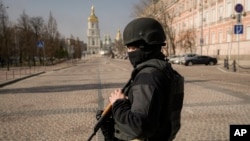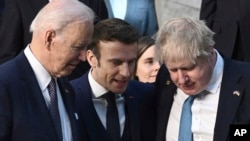NATO leaders are meeting Thursday in Brussels to discuss their short- and long-term response to Russia's month-old invasion of Ukraine, and they are due to hear a direct appeal from Ukrainian President Volodymyr Zelenskyy for more help.
Ahead of the meeting, Zelenskyy used a video message, delivered in English, to ask NATO members for "effective and unrestricted" support, including weapons for Ukrainian forces.
Zelenskyy also appealed to people around the world to hold public protests against the Russian invasion.
"Come with Ukrainian symbols to support Ukraine, to support freedom, to support life," Zelenskyy said. "Come to your squares, to your streets, make yourselves visible and heard."
In addition to the NATO talks, U.S. President Joe Biden is meeting Thursday with G-7 leaders and the European Council. National security adviser Jake Sullivan said the overall goal is to hear "the resolve and unity that we've seen for the past month will endure for as long as it takes."
Sullivan said that includes countries following through on commitments to supply military equipment to Ukraine, to enforce existing sanctions against Russia and to look for ways to augment both along with humanitarian aid for those affected by the fighting.
Biden is due to announce a new round of sanctions targeting Russian political figures, oligarchs and other entities.
Britain said Thursday its new package of sanctions included freezing the assets of Gazprombank, a main channel for oil and gas payments, as well as Alfa Bank, a top private lender in Russia. Oil tycoon Evgeny Shvidler, Sberbank CEO German Gref and Polina Kovaleva, stepdaughter of Foreign Minister Sergei Lavrov were among individuals sanctioned.
"We are determined to continue to impose costs on Russia to bring about an end to this brutal war," Stoltenberg said as he opened Thursday meetings.
He told reporters earlier Thursday that "NATO is providing unprecedented support to Ukraine, helping them to defend themselves."
China has criticized the sanctions imposed on Russia and has drawn warnings from Biden about not helping Russia evade the measures.
Asked about China's role, Stoltenberg said Thursday that China should "join the rest of the world in clearly condemning the Russian invasion of Ukraine and not provide political support neither provide any kind of material support to the Russian invasion of Ukraine."
Stoltenberg told reporters the alliance is establishing four new battlegroups in the alliance's eastern flank as part of its additional defensive measures since Russia's invasion of Ukraine.
The combat-ready units are set to deploy to Bulgaria, Hungary, Romania and Slovakia, according to Stoltenberg, bringing the total number of NATO battlegroups on its eastern flank to eight. The other NATO battlegroups have been fully operational in the Baltic states and Poland since 2017.
The alliance chief also warned against the use of chemical weapons, with NATO leaders expected to provide equipment to help Ukraine protect against chemical, biological, radiological and nuclear threats.
"Any use of chemical weapons would fundamentally change the nature of the conflict," Stoltenberg said. "It would be a blatant violation of international law, and it would have widespread and severe consequences."
Biden administration officials have previously sounded the alarm that Moscow could use chemical weapons in Ukraine and blame the Ukrainians for their use as part of a false-flag operation to justify the Russian invasion. Biden has previously warned that Russia would pay a severe price if it launched a chemical weapons attack but has not specified what that response would involve.
Secretary of State Antony Blinken said Wednesday Russian forces have committed war crimes in Ukraine and that the United States will work to hold Russia accountable.
"We've seen numerous credible reports of indiscriminate attacks and attacks deliberately targeting civilians, as well as other atrocities," Blinken said, adding that many of the apartment buildings, schools, hospitals and other infrastructure hit "have been clearly identifiable as in use by civilians."
The assessment was based on a careful review of public and intelligence information gathered since Russia launched its invasion of Ukraine last month, according to Blinken.
Russia has repeatedly rejected accusations of war crimes.
A senior U.S. defense official told reporters Wednesday that Ukrainians have pushed Russian forces back to about 55 kilometers east and northeast of Kyiv, whereas a day earlier they were about 20 to 30 kilometers away.
Russian forces are still trying to encircle Chernihiv but are stalled between 8 and10 kilometers from the city center, the official added.
A NATO official who was speaking on the condition of anonymity to discuss intelligence told reporters Wednesday that between 7,000 and 15,000 Russian soldiers have been killed in Ukraine.
The official said Russian forces have achieved "almost none" of their strategic objectives, while noting "they are stalled" in the northern cities of Kyiv, Kharkiv and Chernihiv.
Russia is "achieving more results in the south, but the price is horrendous," the official said.
On its English-language Telegram feed, Russia's Ministry of Defense portrayed a vastly different war effort, praising Russian forces as they advanced on parts of southeastern Ukraine while Ukrainian forces fled, and claiming success in taking out Ukrainian fuel depots and positions with "high-precision long-range" weapons.
The United Nations says more than 3.6 million refugees have fled Ukraine since Russia launched its invasion one month ago. Another 6.5 million people have been displaced from their homes within the country.
National Security correspondent Jeff Seldin and U.N. correspondent Margaret Besheer contributed to this report.
Some information came from The Associated Press, Agence France-Presse and Reuters.






